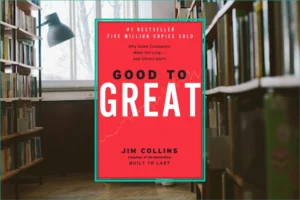
Good to Great by James C. Collins- Book Summary
Good to Great by Jim Collins – Why Some Companies Make the Leap… and Others Don’t Background and Perception When
James C. Collins: Architect of Enduring Organizations and the Science of Greatness
James C. “Jim” Collins, born in 1958 in Boulder, Colorado, is an American researcher, author, and teacher focused on the study of what makes companies and leaders great. Through decades of rigorous empirical research, Collins has built one of the most influential bodies of work in management and leadership science.
Collins began his career at McKinsey & Company before joining Hewlett-Packard. He later earned his MBA from Stanford Graduate School of Business, where he also served on the faculty. In 1995, he founded a management research laboratory in Boulder dedicated to studying the factors behind sustained corporate performance.
His first major success came with Built to Last: Successful Habits of Visionary Companies (1994), co-authored with Jerry Porras. Based on a six-year research project, the book compared visionary companies with less successful peers, uncovering patterns of leadership and culture that enable long-term success. It became a seminal management classic.
Collins expanded on these ideas in Good to Great: Why Some Companies Make the Leap… and Others Don’t (2001), which introduced the “Level 5 Leadership” concept — humility combined with fierce resolve — and the “Hedgehog Concept” for strategic clarity. The book sold over 10 million copies and became required reading for executives worldwide.
He later published Great by Choice (2011) and Turning the Flywheel (2019), exploring how discipline and empirical thinking sustain greatness in volatile environments. Collins’ frameworks have influenced industries ranging from technology and finance to education and the social sector.
Recognized by Forbes and Harvard Business Review as one of the world’s top business thinkers, Collins has also served as a mentor and advisor to corporate leaders, military commanders, and social entrepreneurs. His work integrates rigorous quantitative analysis with deep human insight, bridging science and leadership philosophy.
James C. Collins’ contribution to management thought rests on his belief that greatness is not a function of circumstance but of conscious choice and discipline — an idea that continues to guide leaders seeking to build organizations that endure.

Good to Great by Jim Collins – Why Some Companies Make the Leap… and Others Don’t Background and Perception When

